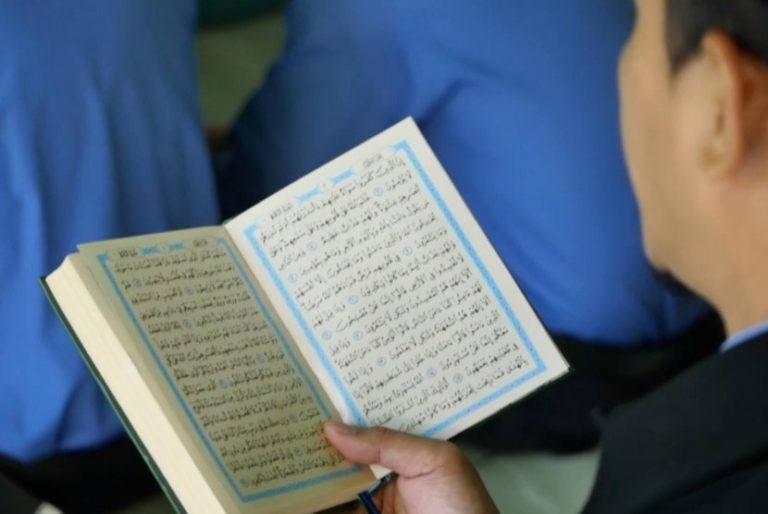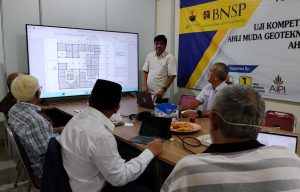By: Ustadz Ali Farkhan Tsani, Journalist of MINA
To fill the days full of blessings in this holy month of Ramadan, let’s decorate it with recitations or recitations of the Al-Quran.
There are two words that are often interpreted the same, namely Tadarus and recitation. Both are related to reading the Quran.
The difference is, reciting means reading the Al-Quran itself with tartil (good and correct) pronunciation. Meanwhile, Tadarus recited Al-Quran with tartil (good and correct) recitation in turns.
Also Read: Verses of the Universe in Gaza: The Unyielding Light of Faith
Both recitations and Tadarus must be accompanied by understanding the meaning of the verses they read. So that from these activities it is hoped that they will get instructions from the verses they read. More than just Qira’ah (reading).
Qira’ah itself, even though reading without knowing its meaning, still gets a reward for every letter it reads. That is one of the virtues of reading the Al-Quran.
This is mentioned in the hadith:
مَنْ قَرَأَ حَرْفًا مِنْ كِتَابِ اللَّهِ فَلَهُ بِهِ حَسَنَةٌ وَالْحَسَنَةُ بِعَشْرِ أَمْثَالِهَا لاَ أَقُولُ الم حرْفٌ وَلَكِنْ أَلِفٌ حَرْفٌ وَلاَمٌ حَرْفٌ وَمِيمٌ حَرْفٌ ».
Also Read: Prophet Sulaiman Alaihi Salam, the Greatest Muslim King of All Time
Meaning: “Whoever reads one letter of the Quran, for him one goodness with that reading, one kindness is multiplied into 10 goodness like that. I did not say الم is a letter but Alif is a letter, Laam is a letter and Meem is a letter.” (HR At-Tirmidhi from Abdullah bin Mas’ud Radhiyallahu ‘Anhu).
Yes, 1 letter 10 kindness, on an ordinary day. On the days of the month of Ramadan, the reward is multiplied by tens, hundreds, thousands to infinity, according to Allah’s will.
The sentence “Bismillahirrahmanirrahim”, alone consists of 19 letters, the reward is 190 goodness, 1,900 goodness, 19,000 goodness, to infinity, according to God’s will.
So, even people who understand the majesty of the blessed month of Ramadan will compete in completing the Al-Quran because of its virtue.
Also Read: Imaam Yakhsyallah Mansur: Surah At-Tin Indicates the Command to Liberate Al-Aqsa
So, do not be surprised if the scholars, pious people, the students compete to complete the Al-Quran in the month of Ramadan several times. There are three times, five times, 10 times, up to 30 times, and so on. This takes place especially in the month of Ramadan.
Even Imam Asy-Shafi’i (150-204 H.) with his love for the Quran, especially during the holy month of Ramadan, recited the Quran 60 times. This means all morning to evening, khatam once, and all night one khatam. That was his love for Kalamullah and the way he glorified the glorious month of Ramadan.
Furthermore, regarding recitations, in the Al-Quran, among others, it is mentioned in the verse:
وَأَنۡ أَتۡلُوَاْ ٱلۡقُرۡءَانَۖ فَمَنِ ٱهۡتَدَىٰ فَإِنَّمَا يَهۡتَدِي لِنَفۡسِهِۦۖ وَمَن ضَلَّ فَقُلۡ إِنَّمَآ أَنَا۠ مِنَ ٱلۡمُنذِرِينَ
Also Read: Imaam Yakhsyallah: Nurture Love for the Prophet, One Will Be with Whom One Loves
Meaning: “And so that I recite the Quran (to people). So whoever gets the guidance, then in fact he only gets the guidance for (good) himself, and whoever goes astray then say: “Indeed I (this) is nothing but one of the warners”. (QS An-Naml [27]: 92).
In the Interpretation of the Al-Quran, the Ministry of Religion of the Republic of Indonesia explained, in this verse, Allah explained that the Prophet Muhammad Shallallahu ‘Alaihi Wasallam was ordered to read the Al-Quran to humans, to reveal the meaning and secrets contained in it, and absorb the arguments about authority. God who can be seen in the universe.
Thus, they can dive into the true essence of life and receive an abundance of God’s grace.
In another verse it says:
Also Read: Friday Sermon: Emulating the Firmness of the Prophet in Struggle
اَلَّذِيْنَ اٰتَيْنٰهُمُ الْكِتٰبَ يَتْلُوْنَهٗ حَقَّ تِلَاوَتِهٖۗ اُولٰۤىِٕكَ يُؤْمِنُوْنَ بِهٖ ۗ وَمَنْ يَّكْفُرْ بِهٖ فَاُولٰۤىِٕكَ هُمُ الْخٰسِرُوْنَ ࣖ
Meaning: “Those to whom We have given the Book, they read it as it should be, they are those who believe in Him. And whoever disbelieves in Him, it is they who are the losers.” (Surah Al-Baqarah [2]: 121).
The recitation of this verse is meant to read it with actual reading by understanding it wholeheartedly, not interpreting it according to one’s own wishes, not adding, subtracting or changing it.
Ibnu Mas’ud added, “Haqqo Tilawatih” means reading with the actual reading, that is, making what is lawful, forbidding what is forbidden, reading it as revealed by Allah, not changing or turning words from their proper place and not interpreting anything from the book with an inappropriate interpretation.
Also Read: Imaam Yakhsyallah: Muslims Unity as Key to Victory of Islam
As for Tadarus Al-Quran, among others, it is mentioned in the verse:
مَا كَانَ لِبَشَرٍ اَنْ يُّؤْتِيَهُ اللّٰهُ الْكِتٰبَ وَالْحُكْمَ وَالنُّبُوَّةَ ثُمَّ يَقُوْلَ لِلنَّاسِ كُوْنُوْا عِبَادًا لِّيْ مِنْ دُوْنِ اللّٰهِ وَلٰكِنْ كُوْنُوْا رَبَّانِيّٖنَ بِمَا كُنْتُمْ تُعَلِّمُوْنَ الْكِتٰبَ وَبِمَا كُنْتُمْ تَدْرُسُوْنَ ۙ
Meaning: “It is impossible for someone who has been given a book by Allah, as well as wisdom and prophethood, then he says to people, “Be you my worshipers, not worshipers of Allah,” but (he said), “Be you servants of Allah, because you teach the book and because you study it!” (QS Ali Imran [3]: 79).
This verse explains that it is not proper for someone who has been given the Bible, wisdom and Prophethood by Allah, then begs people to worship him without Allah or worship him together with Allah. Do not be like the people of the book who worship their priests.
Also Read: Friday Sermon: Prophet Muhammad Is Not a Political Figure
Because the Apostles are Allah’s messengers to His servants, conveying what has been entrusted to them, the tasks that have been carried out as well as possible.
Allah told the Apostles to invite mankind to become experts in worship and piety (rabbaniyin) according to what they learned and knew from the Al-Quran and the books of Allah. The Apostles only worshiped Allah and did not associate partners with him.
Furthermore, the Apostle was in charge of teaching the Bible and studying it.
The word Tadrusun in this verse means to understand, discuss, study it, to get the information and messages it contains.
Also Read: Without Knowledge, Congregation Is Merely a Crowd Without Direction
Thus, a Rabbani (educator, Apostle) must constantly study the Holy Quran and teach it, because humans are not free from flaws and mistakes.
The words of God are so broad in their meaning, that the more they are explored and studied, the more one can achieve even though what is read is the same text.
Allah’s written book (Qouliyah) is no different from His spread book (Qouniyah), namely the universe. Even though the universe has not changed since it was created until now. However, the secret it contains never ends. The secrets of nature are constantly being revealed, and from time to time new things are discovered that have not been discovered before.
In another verse it says:
Also Read: Friday Sermon: Grateful for Indonesia’s Independence by Supporting Palestine’s Freedom
أَمۡ لَكُمۡ كِتَٰبٞ فِيهِ تَدۡرُسُونَ
Meaning: “Or do you have a book (revealed by Allah) that you read?” (QS Al-Qolam [68]: 37).
The word Tadrusun here means studying or researching something in order to take advantage of it. In this case, Tadrusun is discussing the Holy Book (Al-Quran) to retrieve the information and messages it contains.
That’s how, every month of Ramadan, Rasulullah Shallallahu ‘Alaihi Wasallam recites the Koran with the Angel Gabriel. As stated in the hadith:
Also Read: The Bestial Nature of Netanyahu
كَانَ رَسُولُ اللَّهِ صَلَّى اللَّهُ عَلَيْهِ وَسَلَّمَ أَجْوَدَ النَّاسِ وَكَانَ أَجْوَدَ مَا يَكُونُ فِي رَمَضَانَ حِينَ يَلْقَاهُ جِبْرِيلُ وَكَانَ جِبْرِيلُ يَلْقَاهُ فِي كُلِّ لَيْلَةٍ مِنْ شَهْرِ رَمَضَانَ فَيُدَارِسُهُ الْقُرْآنَ
Meaning: “The Messenger of Allah Shallallahu ‘Alaihi Wasallam was the most generous person, and he increased his generosity in the month of Ramadan when he met the Angel Gabriel, and the Angel Gabriel met him every night of Ramadan to study the Al-Quran.” (Reported by Bukhari from Abdullah bin Abbas Radhiyallahu ‘Anhu).
So, by updating the Al-Quran in the month of Ramadan, which is called the month of the Al-Quran, we will be able to improve our reading of the Al-Quran. In addition, by being up to date with the Al-Quran, we can also understand, interpret, live and practice the contents of the Al-Quran.
Hopefully, we can istiqamah decorate amaliyah on the days and nights of this holy month of Ramadan, with recitations and Tadarus Al-Quran. (T/RE1)
Mi’raj News Agency (MINA)



































 Mina Indonesia
Mina Indonesia Mina Arabic
Mina Arabic